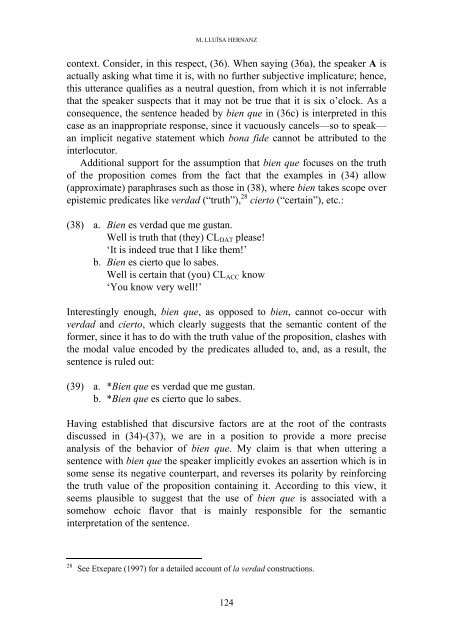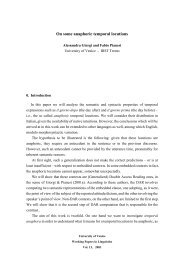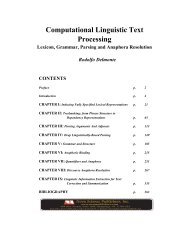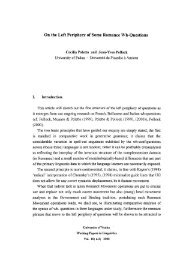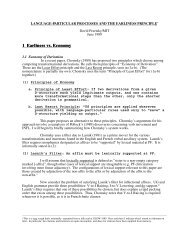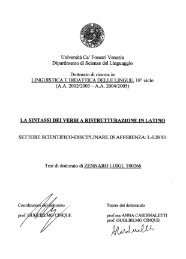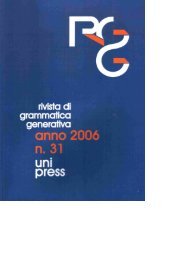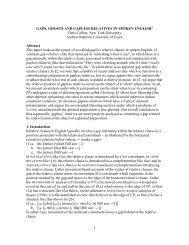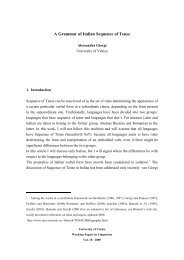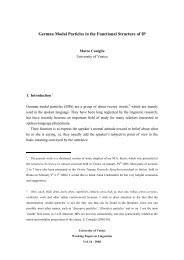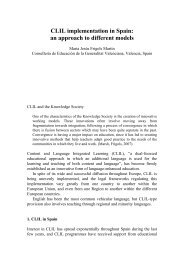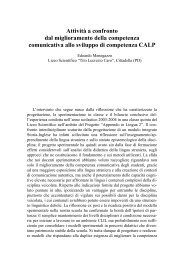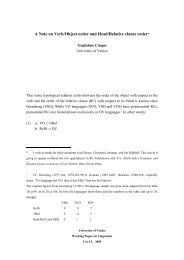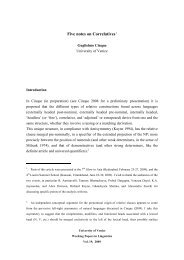Emphatic Polarity and C in Spanish - Lear
Emphatic Polarity and C in Spanish - Lear
Emphatic Polarity and C in Spanish - Lear
You also want an ePaper? Increase the reach of your titles
YUMPU automatically turns print PDFs into web optimized ePapers that Google loves.
M. LLUÏSA HERNANZ<br />
context. Consider, <strong>in</strong> this respect, (36). When say<strong>in</strong>g (36a), the speaker A is<br />
actually ask<strong>in</strong>g what time it is, with no further subjective implicature; hence,<br />
this utterance qualifies as a neutral question, from which it is not <strong>in</strong>ferrable<br />
that the speaker suspects that it may not be true that it is six o’clock. As a<br />
consequence, the sentence headed by bien que <strong>in</strong> (36c) is <strong>in</strong>terpreted <strong>in</strong> this<br />
case as an <strong>in</strong>appropriate response, s<strong>in</strong>ce it vacuously cancels—so to speak—<br />
an implicit negative statement which bona fide cannot be attributed to the<br />
<strong>in</strong>terlocutor.<br />
Additional support for the assumption that bien que focuses on the truth<br />
of the proposition comes from the fact that the examples <strong>in</strong> (34) allow<br />
(approximate) paraphrases such as those <strong>in</strong> (38), where bien takes scope over<br />
epistemic predicates like verdad (“truth”), 28 cierto (“certa<strong>in</strong>”), etc.:<br />
(38) a. Bien es verdad que me gustan.<br />
Well is truth that (they) CLDAT please!<br />
‘It is <strong>in</strong>deed true that I like them!’<br />
b. Bien es cierto que lo sabes.<br />
Well is certa<strong>in</strong> that (you) CLACC know<br />
‘You know very well!’<br />
Interest<strong>in</strong>gly enough, bien que, as opposed to bien, cannot co-occur with<br />
verdad <strong>and</strong> cierto, which clearly suggests that the semantic content of the<br />
former, s<strong>in</strong>ce it has to do with the truth value of the proposition, clashes with<br />
the modal value encoded by the predicates alluded to, <strong>and</strong>, as a result, the<br />
sentence is ruled out:<br />
(39) a. *Bien que es verdad que me gustan.<br />
b. *Bien que es cierto que lo sabes.<br />
Hav<strong>in</strong>g established that discursive factors are at the root of the contrasts<br />
discussed <strong>in</strong> (34)-(37), we are <strong>in</strong> a position to provide a more precise<br />
analysis of the behavior of bien que. My claim is that when utter<strong>in</strong>g a<br />
sentence with bien que the speaker implicitly evokes an assertion which is <strong>in</strong><br />
some sense its negative counterpart, <strong>and</strong> reverses its polarity by re<strong>in</strong>forc<strong>in</strong>g<br />
the truth value of the proposition conta<strong>in</strong><strong>in</strong>g it. Accord<strong>in</strong>g to this view, it<br />
seems plausible to suggest that the use of bien que is associated with a<br />
somehow echoic flavor that is ma<strong>in</strong>ly responsible for the semantic<br />
<strong>in</strong>terpretation of the sentence.<br />
28 See Etxepare (1997) for a detailed account of la verdad constructions.<br />
124


